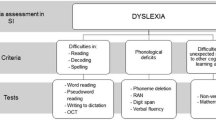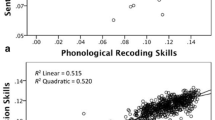Abstract
Three groups of reading-disabled children were found in studies of English, German, and French: a group with a double deficit in reading and spelling, a group with a single spelling deficit, and a more rarely reported group presenting a single reading deficit. This study set out to examine whether these groups can be found in adults, readers and spellers of Hebrew, which differs from the previously studied orthographies in many aspects. To this end, Hebrew-speaking adults with or without reading disability were administered various literacy and literacy-related tests. Results confirm the existence of the same three groups. While all shared a phonological deficit, subtle differences in phonological decoding ability and in speed of processing distinguished between the groups. The study therefore suggests that the previously reported associations and dissociations between reading and spelling are not restricted to English, German, or French and may not be only developmental in nature.
Similar content being viewed by others
References
Annett, M. (1985). Left, right, hand and brain: The right shift theory. Hillsdale: Erlbaum.
APA (American Psychiatric Association). (1994). Diagnostic and statistical manual of mental disorders (DSM-IV) (4th ed.). Washington: The American Psychiatric Association.
Bar-Kochva, I., & Breznitz, Z. (2014). Reading proficiency and adaptability in orthographic processing: an examination of the effects of type of orthography read on brain activity in regular and dyslexic readers. PLoS ONE (Public Library of Science), 9(1), e86016. doi:10.1371/journal.pone.0086016.
Breznitz, Z. (2006). Fluency in reading: Synchronization of processes. Mahwah: Routledge.
Breznitz, Z. (2005). Brain activity during performance of naming tasks: Comparison between dyslexic and regular readers. Sientific Studies of Reading, 9(1), 17–42.
Breznitz, Z., & Misra, M. (2003). Speed of processing of the visual–orthographic and auditory–phonological systems in adult dyslexics: The contribution of “asynchrony” to word recognition deficits. Brain and Language, 85, 486–502.
Breznitz, Z., Shaul, S., Horowitz-Kraus, T., Sela, I., Nevat, M., & Karni, A. (2013). Enhanced reading by training with imposed time constraint in typical and dyslexic adults. Nature Communications, 4, 1486. doi:10.1038/ncomms2488.
Bruck, M., & Waters, G. (1990). An analysis of the component spelling and reading skills of good readers-good spellers, good readers-poor spellers, and poor readers-poor spellers. In T. H. Carr & B. A. Levy (Eds.), Reading and its development: Component skills approaches (pp. 161–206). San Diego: Academic.
Bruck, M., & Waters, G. (1988). An analysis of the spelling errors of children who differ in their reading and spelling skills. Applied Psycholinguistics, 9, 77–92.
Burden, V. (1992). Why are some ‘normal’ readers such poor spellers? In C. M. Sterling & C. Robson (Eds.), Psychology: Spelling and education (pp. 200–214). Clevedon: Multilingual Matters.
Center for Psychometric Tests (1994). Comprehension test, Israeli Psychometric Scholastic Aptitude Test, Tel Aviv.
Denckla, M. B., & Rudel, R. G. (1976). Rapid automatized naming (R.A.N.): Dyslexia differentiated from other learning disabilities. Neuropsychologia, 4, 471–479.
Deutsch, A., Frost, R., & Forster, K. I. (1998). Verbs and nouns are organized and accessed differently in the mental lexicon: Evidence from Hebrew. Journal of Experimental Psychology. Learning, Memory, and Cognition, 24, 1238–1255.
Ehri, L. C. (2005). Learning to read words: Theory, findings, and issues. Scientific Studies of Reading, 9(2), 167–188.
Fayol, M., Zorman, M., & Lété, B. (2009). Associations and dissociations in reading and spelling French: Unexpectedly poor and good spellers. British Journal of Educational Psychology, 00, 1–14.
Fletcher, J. M. (2009). Dyslexia: The evolution of a scientific concept. Journal of the International Neuropsychological Society, 15, 501–508.
Frith, U. (1980). Unexpected spelling problems. In U. Frith (Ed.), Cognitive processes in spelling (pp. 495–515). London: Academic.
Frost, R., Forster, K. I., & Deutsch, A. (1997). What can we learn from the morphology of Hebrew: A masked priming investigation of morphological representation. Journal of Experimental Psychology. Learning, Memory, and Cognition, 23, 829–856.
Holmes, V. M., & Carruthers, J. (1998). The relation between reading and spelling in skilled adult readers. Journal of Memory and Language, 39, 264–289.
Holmes, V. M., & Castles, A. E. (2001). Unexpectedly poor spelling in university students. Scientific Studies of Reading, 5, 319–350.
Holmes, V. M., & Ng, E. C. (1993). Word specific knowledge, word-recognition strategies, and spelling abilities. Journal of Memory and Language, 32, 230–257.
Horowitz-Kraus, T., & Breznitz, Z. (2009). Can the error detection mechanism benefit from training the working memory? A comparison between dyslexics and controls—An ERP study. PLoS One, 25, 4(9), e7141. doi:10.1371/journal.pone.0007141.
Lovett, M. W. (1987). A developmental approach to reading disability: Accuracy and speed criteria of normal and deficient reading skill. Child Development, 58, 234–260.
Lyon, G. R., Shaywitz, S. E., & Shaywitz, B. A. (2003). Defining dyslexia, comorbidity, teachers’ knowledge of language and reading a definition of dyslexia. Annals of Dyslexia, 53, 1–14.
Moll, K., & Landerl, K. (2009). Double dissociation between reading and spelling deficits, scientific studies of reading. Scientific Studies of Reading, 13(5), 359–382.
Newman, S., Fields, H., & Wright, S. (1993). A developmental study of specific spelling disability. British Journal of Educational Psychology, 63(2), 287–296.
Paulesu, E., Démonet, J. F., Fazio, F., McCrory, E., Chanoine, V., Brunswick, N., … & Frith, U. (2001). Dyslexia: Cultural diversity and biological unity. Science, 291(5511), 2165–2167.
Perfetti, C. A. (1992). The representation problem in reading acquisition. In P. B. Gough, L. C. Ehri, & R. Treiman (Eds.), Reading acquisition (pp. 145–174). Hillsdale: Erlbaum.
Purcell, J. J., Napoliello, E. M., & Eden, G. F. (2011). A combined fMRI study of typed spelling and reading. NeuroImage, 55(2), 750–762.
Romani, C., Olson, A., & Di Betta, A. M. (2005). Spelling disorders. In M. J. Snowling & C. Hulme (Eds.), The science of reading: A handbook (pp. 431–447). Oxford: Blackwell.
Share, D. (1995). Phonological recoding and self-teaching: Sine qua non of reading acquisition. Cognition, 55, 151–218.
Share, D., & Levin, I. (1999). Learning to read and write in Hebrew. In M. Harris & G. Hatano (Eds.), Learning to read and write: A cross-linguistic perspective (pp. 89–111). Cambridge: Cambridge University Press.
Shatil, E. (2001). Dictation test. Haifa: Unpublished test. University of Haifa.
Shatil, E. (1997). One-minute test for word and pseudowords. Haifa: University of Haifa.
Treiman, R. (1993). Beginning to spell. Oxford: Oxford University Press.
Wechsler, D. (1997). WAIS-III adult intelligence scale. San Antonio: Psychological Corporation.
Wimmer, H., & Mayringer, H. (2002). Dysfluent reading in the absence of spelling difficulties: A specific disability in regular orthographies. Journal of Educational Psychology, 94, 272–277.
Wimmer, H., Mayringer, H., & Landerl, K. (2000). The double-deficit hypothesis and difficulties in learning to read a regular orthography. Journal of Educational Psychology, 92(4), 668.
Wolf, M., Bowers, G. P., & Biddle, K. (2000). Naming speed processes, timing, and reading: A conceptual review. Journal of Learning Disabilities, 33, 387–407.
Acknowledgments
Support for this research was provided by the Edmond J. Safra Philanthropic Foundation. The authors are greatly indebted to Prof. Zvia Breznitz for her constructive advice.
Author information
Authors and Affiliations
Corresponding author
Additional information
The study was carried out at the Edmond J. Safra Brain Research Center for the Study of Learning Disabilities, University of Haifa, Israel
Rights and permissions
About this article
Cite this article
Bar-Kochva, I., Amiel, M. The relations between reading and spelling: an examination of subtypes of reading disability. Ann. of Dyslexia 66, 219–234 (2016). https://doi.org/10.1007/s11881-015-0117-8
Received:
Accepted:
Published:
Issue Date:
DOI: https://doi.org/10.1007/s11881-015-0117-8




